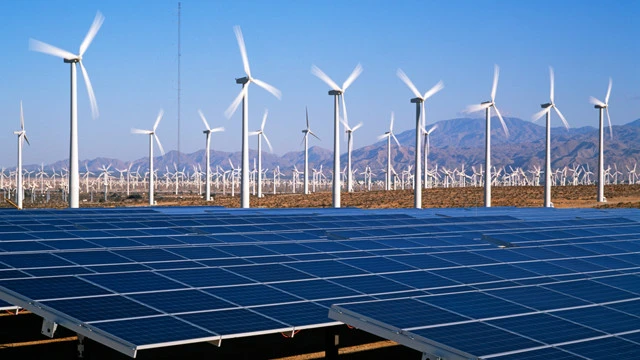Renewable energy refers to energy derived from sources that are naturally replenished on a human timescale and can be continuously used without the risk of depletion. Unlike fossil fuels, which are finite and contribute to environmental degradation, renewable energy sources offer sustainable alternatives that have minimal environmental impact.
Renewable energy sources include sunlight, wind, water (hydroelectric), geothermal heat, and biomass. These sources are abundant, and harnessing them does not produce greenhouse gas emissions or other pollutants associated with fossil fuels. Renewable energy technologies convert these natural resources into electricity, heat, and mechanical power, providing clean and sustainable energy solutions.
Applications
- Electricity Generation: Renewable energy technologies are primarily used for electricity generation. Solar photovoltaic (PV) panels, wind turbines, hydroelectric dams, geothermal power plants, and biomass facilities convert renewable resources into electricity to power homes, businesses, and industries.
- Heating and Cooling: Renewable energy can also be used for heating and cooling purposes. Solar thermal systems capture sunlight to heat water for residential and commercial use, while geothermal heat pumps harness the natural warmth of the Earth's crust to provide space heating and cooling.
- Transportation: Renewable energy is increasingly being used to power electric vehicles (EVs) and hybrid vehicles, reducing dependence on fossil fuels in the transportation sector. Biofuels derived from organic materials such as crops, algae, and waste products can be used as sustainable alternatives to gasoline and diesel.
- Industrial Processes: Renewable energy technologies can supplement or replace traditional fossil fuel-based processes in various industries, including manufacturing, agriculture, and food processing. Solar energy, biomass, and geothermal heat can provide process heat, steam, and mechanical power for industrial applications.
Industries Served
- Energy Production: The renewable energy sector encompasses companies involved in the production, distribution, and sale of renewable energy. This includes solar, wind, hydroelectric, geothermal, and biomass energy producers, as well as utility companies that integrate renewable energy into their power grids.
- Manufacturing and Construction: The manufacturing and construction industries play a critical role in the production and installation of renewable energy technologies. Companies manufacture solar panels, wind turbines, hydroelectric turbines, geothermal heat pumps, and other renewable energy equipment.
- Transportation: The transportation industry benefits from renewable energy through the development and adoption of electric vehicles (EVs), hybrid vehicles, and alternative fuels such as biofuels. Automakers, electric vehicle manufacturers, and charging infrastructure providers are key players in this sector.
- Research and Development: Research institutions, universities, and private companies are involved in the research and development of new renewable energy technologies, materials, and manufacturing processes. This includes advancements in solar cell efficiency, wind turbine design, energy storage systems, and grid integration solutions.
- Policy and Regulation: Governments, regulatory agencies, and policymakers play a crucial role in shaping the renewable energy landscape through incentives, subsidies, tax credits, and regulations that promote clean energy adoption, reduce carbon emissions, and accelerate the transition to a low-carbon economy.
Target Areas and Considerations
- Climate Change Mitigation: Renewable energy is a key tool in mitigating climate change by reducing greenhouse gas emissions from fossil fuel combustion. Transitioning to renewable energy sources can help limit global warming and its associated impacts on the environment, public health, and ecosystems.
- Energy Security: Renewable energy enhances energy security by diversifying energy sources and reducing reliance on imported fossil fuels. Locally available renewable resources can provide a reliable and resilient energy supply, reducing vulnerability to geopolitical risks and supply disruptions.
- Economic Development: The renewable energy sector creates jobs, stimulates economic growth, and attracts investment in clean energy infrastructure and technology. Renewable energy projects contribute to local economies through job creation, tax revenues, and investments in rural communities.
- Environmental Conservation: Renewable energy technologies have minimal environmental impact compared to fossil fuels, which emit pollutants and contribute to air and water pollution, habitat destruction, and ecosystem degradation. Renewable energy deployment can help preserve natural resources, protect biodiversity, and safeguard ecosystems.
- Energy Access: Renewable energy can expand access to electricity and modern energy services in remote and underserved areas, where grid infrastructure is limited or nonexistent. Off-grid solar systems, microgrids, and decentralized energy solutions provide reliable and affordable electricity to off-grid communities, improving quality of life and supporting economic development.
Renewable energy is a vital component of the transition to a sustainable and low-carbon energy future. With continued innovation, investment, and policy support, renewable energy technologies will play a central role in addressing climate change, promoting economic development, enhancing energy security, and ensuring access to clean and affordable energy for all.
